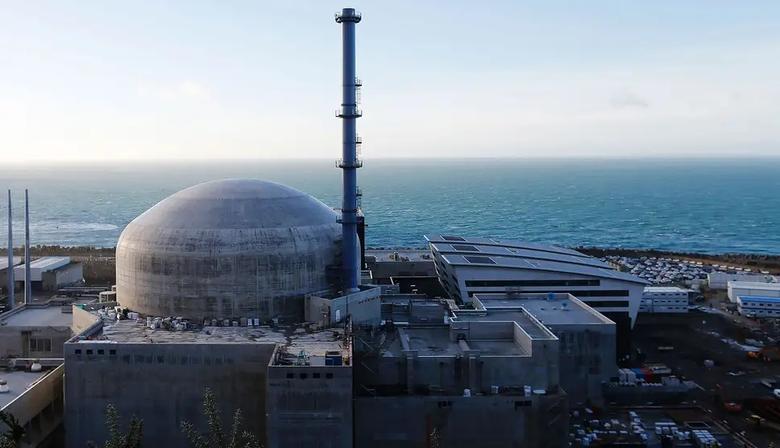
FRANCE'S NUCLEAR IS IMPORTANT

WNN - Although it has long been considered a leading proponent of nuclear energy, France's energy mix looks set to change. On 27 November last year, President Emmanuel Macron unveiled the programmation pluriannuelle de l'énergie (PPE), a strategy document for managing the energy transition over the coming decades. At its core, the PPE aims to reduce France's utilisation of its nuclear fleet, which today represents around three-quarters of its generating capacity. By 2035, the PPE states, this figure should fall to around 50%.
This, of course, has direct implications for EDF, the country's monopoly nuclear operator. But the near-term ramifications could be less severe than some may first suspect. In fact, the PPE largely preserves the status quo: it does not accelerate the pace of France's energy transition; nor will it be likely to prompt anything but marginal revisions to EDF's strategy, which already allows for introducing renewables to the grid. So, while structural challenges remain for EDF, nuclear generation will likely remain crucial for France's grid - and for some time yet.
Strategy deviations likely to be marginal
What next for EDF? In order to fulfil the PPE's target, the utility looks set to shutter 12.6 gigawatts (GW) of capacity from its 63 GWe nuclear fleet by 2035.
The PPE offers some flexibility in achieving this: aside from the closure of the two Fessenheim reactors next year, there are currently no planned closures before 2027. But this could change as the energy landscape in Europe develops. For instance, the enforced rate of development of renewable energy sources could lead to grid oversupply at certain times and price volatility. In such a scenario, the PPE provides flexibility for the closure of an additional two plants in 2025 and 2026. For the most part, however, the shuttering of EDF's nuclear capacity should be gradual.
Additionally, we expect no material changes to EDF's investment profile, either. For instance, France's EUR45 billion (USD51 billion) nuclear investment plan, known as the Grand Carénage, will continue. Much of this investment plan, which will allow EDF to extend the lifespan of the entire nuclear fleet to 50 years, should be completed by 2025.
France's ambitious energy plan will require substantial investment efforts over the next few years. Against this backdrop, the French government has expressed a willingness to propose a new remuneration framework for the existing nuclear fleet - though the timing and details of such a regulatory change remain uncertain and remote. What's more, the French state has opened the option of increasing its stake in EDF (currently 83.7%) by as early as 2019. If, or indeed when, these developments are implemented it could be credit positive.
The future for nuclear
The PPE does not herald the end for nuclear power in France. In fact, while the plan involves reducing nuclear capacity, it also highlights France's continued pro-nuclear stance for decades to come. We understand that after 2035, the share of nuclear in the energy mix will stay at about 50%. And currently there are no stated intentions in the draft PPE to reduce this share further.
As such, this would imply that further life extensions to the existing fleet as well as construction of new reactors may be necessary. While no decision has been made on the latter, new nuclear projects could be examined from as early as 2021. And, if economically viable, we understand that the French government would be in favour of new reactor building. French nuclear, then, though sure to decline in dominance, is still important for the future.
-----
Earlier:

2019, April, 10, 10:45:00
RUSSIA'S GAS FOR FRANCE +58%
It was noted that France ranks among Gazprom's key markets in Europe. The Company's gas exports to the country grew by 58 per cent in five years, reaching 12.9 billion cubic meters in 2018.
|

2019, April, 5, 09:55:00
FRANCE'S HYDROGEN ENERGY
France's EDF has launched a hydrogen production and distribution subsidiary to support decarbonisation of industry and mobility using low-carbon electricity from its nuclear and renewable energy fleet.
|

2019, March, 29, 10:50:00
FRANCE, CHINA NUCLEAR
Chinese President Xi Jinping and French President Emmanuel Macron discussed common goals for nuclear power and the fight against climate change in bilateral talks held on 25 March during Xi’s three-day state visit to France. Macron's statement specifically mentioned the long-awaited project for cooperation to build a plant to reprocess China's used nuclear fuel.
|

2019, February, 20, 10:45:00
FRANCE'S NUCLEAR POWER UP
WNN - EDF in 2018 achieved all its financial objectives and exceeded the targets of its performance plan, company chairman and CEO Jean-Bernard Lévy announced last week. Its performance would be "amplified" in 2019, he said during the presentation of its results.
|

2019, January, 30, 10:40:00
FRANCE'S NUCLEAR CHANGES
WNN - President Emmanuel Macron announced last November that a total of 14 French power reactors of 900 MWe capacity will be shut down in order to reduce the share of nuclear in the country's electricity generation mix from the current 75% to 50% by 2035.
|

2018, November, 28, 12:25:00
FRANCE UPDATES NUCLEAR
WNN - "I was not elected on a promise to exit nuclear power but to reduce the share of nuclear in our energy mix to 50%," Macron said. He stressed, "To reduce the share of nuclear power is not to give up nuclear power."
|

2018, October, 12, 10:50:00
FRENCH NUCLEAR UP BY 2.7%
REUTERS - French utility EDF said on Tuesday that nuclear electricity generation from its reactors in France rose 2.7 percent to 30.1 terrawatt hour (TWh) compared with the same month a year ago, due to lower volume of outages.
|












